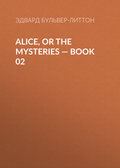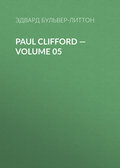
Эдвард Бульвер-Литтон
Kenelm Chillingly — Volume 07
CHAPTER IV
TOM went away the next morning. He declined to see Jessie again, saying curtly, "I don't wish the impression made on me the other evening to incur a chance of being weakened."
Kenelm was in no mood to regret his friend's departure. Despite all the improvement in Tom's manners and culture, which raised him so much nearer to equality with the polite and instructed heir of the Chillinglys, Kenelm would have felt more in sympathy and rapport with the old disconsolate fellow-wanderer who had reclined with him on the grass, listening to the minstrel's talk or verse, than he did with the practical, rising citizen of Luscombe. To the young lover of Lily Mordaunt there was a discord, a jar, in the knowledge that the human heart admits of such well-reasoned, well-justified transfers of allegiance; a Jessie to-day, or an Emily to-morrow; "La reine est morte: vive la reine"
An hour or two after Tom had gone, Kenelm found himself almost mechanically led towards Braefieldville. He had instinctively divined Elsie's secret wish with regard to himself and Lily, however skilfully she thought she had concealed it.
At Braefieldville he should hear talk of Lily, and in the scenes where Lily had been first beheld.
He found Mrs. Braefield alone in the drawing-room, seated by a table covered with flowers, which she was assorting and intermixing for the vases to which they were destined.
It struck him that her manner was more reserved than usual and somewhat embarrassed; and when, after a few preliminary matters of small talk, he rushed boldly /in medias res/ and asked if she had seen Mrs. Cameron lately, she replied briefly, "Yes, I called there the other day," and immediately changed the conversation to the troubled state of the Continent.
Kenelm was resolved not to be so put off, and presently returned to the charge.
"The other day you proposed an excursion to the site of the Roman villa, and said you would ask Mrs. Cameron to be of the party. Perhaps you have forgotten it?"
"No; but Mrs. Cameron declines. We can ask the Emlyns instead. He will be an excellent /cicerone/."
"Excellent! Why did Mrs. Cameron decline?"
Elsie hesitated, and then lifted her clear brown eyes to his face, with a sudden determination to bring matters to a crisis.
"I cannot say why Mrs. Cameron declined, but in declining she acted very wisely and very honourably. Listen to me, Mr. Chillingly. You know how highly I esteem, and how cordially I like you, and judging by what I felt for some weeks, perhaps longer, after we parted at Tor Hadham—" Here again she hesitated, and, with a half laugh and a slight blush, again went resolutely on. "If I were Lily's aunt or elder sister, I should do as Mrs. Cameron does; decline to let Lily see much more of a young gentleman too much above her in wealth and station for—"
"Stop," cried Kenelm, haughtily, "I cannot allow that any man's wealth or station would warrant his presumption in thinking himself above Miss Mordaunt."
"Above her in natural grace and refinement, certainly not. But in the world there are other considerations which, perhaps, Sir Peter and Lady Chillingly might take into account."
"You did not think of that before you last saw Mrs. Cameron."
"Honestly speaking, I did not. Assured that Miss Mordaunt was a gentlewoman by birth, I did not sufficiently reflect upon other disparities."
"You know, then, that she is by birth a gentlewoman?"
"I only know it as all here do, by the assurance of Mrs. Cameron, whom no one could suppose not to be a lady. But there are different degrees of lady and of gentleman, which are little heeded in the ordinary intercourse of society, but become very perceptible in questions of matrimonial alliance; and Mrs. Cameron herself says very plainly that she does not consider her niece to belong to that station in life from which Sir Peter and Lady Chillingly would naturally wish their son should select his bride. Then (holding out her hand) pardon me if I have wounded or offended you. I speak as a true friend to you and to Lily both. Earnestly I advise you, if Miss Mordaunt be the cause of your lingering here, earnestly I advise you to leave while yet in time for her peace of mind and your own."
"Her peace of mind," said Kenelm, in low faltering tones, scarcely hearing the rest of Mrs. Braefield's speech. "Her peace of mind? Do you sincerely think that she cares for me,—could care for me,—if I stayed?"
"I wish I could answer you decidedly. I am not in the secrets of her heart. I can but conjecture that it might be dangerous for the peace of any young girl to see too much of a man like yourself, to divine that he loved her, and not to be aware that he could not, with the approval of his family, ask her to become his wife."
Kenelm bent his face down, and covered it with his right hand. He did not speak for some moments. Then he rose, the fresh cheek very pale, and said,—
"You are right. Miss Mordaunt's peace of mind must be the first consideration. Excuse me if I quit you thus abruptly. You have given me much to think of, and I can only think of it adequately when alone."
CHAPTER V
FROM KENELM CHILLINGLY TO SIR PETER CHILLINGLY
MY FATHER, MY DEAR FATHER,—This is no reply to your letters. I know not if itself can be called a letter. I cannot yet decide whether it be meant to reach your hands. Tired with talking to myself, I sit down to talk to you. Often have I reproached myself for not seeing every fitting occasion to let you distinctly know how warmly I love, how deeply I reverence you; you, O friend, O father. But we Chillinglys are not a demonstrative race. I don't remember that you, by words, ever expressed to me the truth that you loved your son infinitely more than he deserves. Yet, do I not know that you would send all your beloved old books to the hammer rather than I should pine in vain for some untried, if sinless, delight on which I had set my heart? And do you not know equally well, that I would part with all my heritage, and turn day-labourer, rather than you should miss the beloved old books?
That mutual knowledge is taken for granted in all that my heart yearns to pour forth to your own. But, if I divine aright, a day is coming when, as between you and me, there must be a sacrifice on the part of one to the other. If so, I implore that the sacrifice may come from you. How is this? How am I so ungenerous, so egotistical, so selfish, so ungratefully unmindful of all I already owe to you, and may never repay? I can only answer, "It is fate, it is nature, it is love "—
. . . . . . . . .
Here I must break off. It is midnight, the moon halts opposite to the window at which I sit, and on the stream that runs below there is a long narrow track on which every wave trembles in her light; on either side of the moonlit track all the other waves, running equally to their grave in the invisible deep, seem motionless and dark. I can write no more.
. . . . . . . . .
(Dated two days later.)
They say she is beneath us in wealth and station. Are we, my father—we, two well-born gentlemen—coveters of gold or lackeys of the great? When I was at college, if there were any there more heartily despised than another it was the parasite and the tuft-hunter; the man who chose his friends according as their money or their rank might be of use to him. If so mean where the choice is so little important to the happiness and career of a man who has something of manhood in him, how much more mean to be the parasite and tuft-hunter in deciding what woman to love, what woman to select as the sweetener and ennobler of one's everyday life! Could she be to my life that sweetener, that ennobler? I firmly believe it. Already life itself has gained a charm that I never even guessed in it before; already I begin, though as yet but faintly and vaguely, to recognize that interest in the objects and aspirations of my fellow-men which is strongest in those whom posterity ranks among its ennoblers. In this quiet village it is true that I might find examples enough to prove that man is not meant to meditate upon life, but to take active part in it, and in that action to find his uses. But I doubt if I should have profited by such examples; if I should not have looked on this small stage of the world as I have looked on the large one, with the indifferent eyes of a spectator on a trite familiar play carried on by ordinary actors, had not my whole being suddenly leaped out of philosophy into passion, and, at once made warmly human, sympathized with humanity wherever it burned and glowed. Ah, is there to be any doubt of what station, as mortal bride, is due to her,—her, my princess, my fairy? If so, how contented you shall be, my father, with the worldly career of your son! how perseveringly he will strive (and when did perseverance fail?) to supply all his deficiencies of intellect, genius, knowledge, by the energy concentrated on a single object which—more than intellect, genius, knowledge, unless they attain to equal energy equally concentrated—commands what the world calls honours.
Yes, with her, with her as the bearer of my name, with her to whom I, whatever I might do of good or of great, could say, "It is thy work," I promise that you shall bless the day when you took to your arms a daughter.
. . . . . . . . .
"Thou art in contact with the beloved in all that thou feelest elevated above thee." So it is written by one of those weird Germans who search in our bosoms for the seeds of buried truths, and conjure them into flowers before we ourselves were even aware of the seeds.
Every thought that associates itself with my beloved seems to me born with wings.
. . . . . . . . .
I have just seen her, just parted from her. Since I had been told—kindly, wisely told—that I had no right to hazard her peace of mind unless I were privileged to woo and to win her, I promised myself that I would shun her presence until I had bared my heart to you, as I am doing now, and received that privilege from yourself; for even had I never made the promise that binds my honour, your consent and blessing must hallow my choice. I do not feel as if I could dare to ask one so innocent and fair to wed an ungrateful, disobedient son. But this evening I met her, unexpectedly, at the vicar's, an excellent man, from whom I have learned much; whose precepts, whose example, whose delight in his home, and his life at once active and serene, are in harmony with my own dreams when I dream of her.
I will tell you the name of the beloved; hold it as yet a profound secret between you and me. But oh for the day when I may hear you call her by that name, and print on her forehead the only kiss by man of which I should not be jealous.
It is Sunday, and after the evening service it is my friend's custom to gather his children round him, and, without any formal sermon or discourse, engage their interests in subjects harmonious to associations with the sanctity of the day; often not directly bearing upon religion; more often, indeed, playfully starting from some little incident or some slight story-book which had amused the children in the course of the past week, and then gradually winding into reference to some sweet moral precept or illustration from some divine example. It is a maxim with him that, while much that children must learn they can only learn well through conscious labour, and as positive task-work, yet Religion should be connected in their minds not with labour and task-work, but should become insensibly infused into their habits of thought, blending itself with memories and images of peace and love; with the indulgent tenderness of the earliest teachers, the sinless mirthfulness of the earliest home; with consolation in after sorrows, support through after trials, and never parting company with its twin sister, Hope.
I entered the vicar's room this evening just as the group had collected round him. By the side of his wife sat a lady in whom I feel a keen interest. Her face wears that kind of calm which speaks of the lassitude bequeathed by sorrow. She is the aunt of my beloved one. Lily had nestled herself on a low ottoman, at the good pastor's feet, with one of his little girls, round whose shoulder she had wound her arm. She is much more fond of the companionship of children than that of girls of her own age. The vicar's wife, a very clever woman, once, in my hearing, took her to task for this preference, asking her why she persisted in grouping herself with mere infants who could teach her nothing? Ah! could you have seen the innocent, angel-like expression of her face when she answered simply, "I suppose because with them I feel safer, I mean nearer to God."
Mr. Emlyn—that is the name of the vicar—deduced his homily this evening from a pretty fairy tale which Lily had been telling to his children the day before, and which he drew her on to repeat.
Take, in brief, the substance of the story:—
"Once on a time, a king and queen made themselves very unhappy because they had no heir to their throne; and they prayed for one; and lo, on some bright summer morning, the queen, waking from sleep, saw a cradle beside her bed, and in the cradle a beautiful sleeping babe. Great day throughout the kingdom! But as the infant grew up, it became very wayward and fretful: it lost its beauty; it would not learn its lessons; it was as naughty as a child could be. The parents were very sorrowful; the heir, so longed for, promised to be a great plague to themselves and their subjects. At last one day, to add to their trouble, two little bumps appeared on the prince's shoulders. All the doctors were consulted as to the cause and the cure of this deformity. Of course they tried the effect of back-bands and steel machines, which gave the poor little prince great pain, and made him more unamiable than ever. The bumps, nevertheless, grew larger, and as they increased, so the prince sickened and pined away. At last a skilful surgeon proposed, as the only chance of saving the prince's life, that the bumps should be cut out; and the next morning was fixed for that operation. But at night the queen saw, or dreamed she saw, a beautiful shape standing by her bedside. And it said to her reproachfully, 'Ungrateful woman! How wouldst thou repay me for the precious boon that my favour bestowed on thee! In me behold the Queen of the Fairies. For the heir to thy kingdom, I consigned to thy charge an infant from Fairyland, to become a blessing to thee and to thy people; and thou wouldst inflict upon it a death of torture by the surgeon's knife.' And the queen answered, 'Precious indeed thou mayest call the boon,—a miserable, sickly, feverish changeling.'







